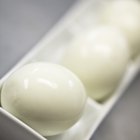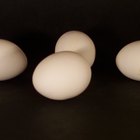
Careful attention to measurements is key when it comes to successful baking. This is especially true for eggs. While the right amount of eggs creates a light and airy texture, too many in a baking recipe yields a dry cake. Large eggs are the standard in baking recipes, but if the instructions call for large eggs and you only have medium, no worries. Substituting medium eggs for large is acceptable with a few adjustments.
Egg Sizes
Living conditions, temperatures, feed and hen weight determine the size of the eggs that are produced. For instance, a hen that lives in a hot climate lays smaller eggs than one who lives in a cooler environment. Size is determined not by an egg's circumference, but by its weight. While large eggs average 24 ounces per dozen, medium eggs only average 21 ounces per dozen. Although the difference in weight is not considerable, from a baking standpoint, every ounce matters.
Whole Eggs
For recipes that require one, two or three large eggs, substituting medium eggs will do. In recipes that call for four large eggs or more, substitute a matching amount of medium eggs, plus one. For instance, five medium eggs are necessary for recipes that require four large eggs. If substituting medium eggs for large in a recipe that requires five large eggs, add six medium eggs. For six large eggs, substitute seven medium eggs.
One Cup of Eggs
Add five medium eggs to recipes that call for a cup of whole eggs -- the equivalent of five large eggs. Baking recipes that call for a cup of egg whites, require the whites of seven large eggs. If you only have medium, add the whites of eight eggs. To substitute medium eggs for large in recipes that recommend a cup of egg yolks, add the yolks of 16 medium eggs -- two more than the required 14 large eggs.
Room-Temperature Eggs
A rule in baking that is commonly overlooked is the use of room-temperature eggs. Regardless of size, eggs straight from the refrigerator may cause the batter to turn lumpy, adversely affecting the texture of whatever you are baking. Set cold eggs in a bowl of warm water for 10 to 15 minutes to bring them to room temperature, or remove the eggs from the refrigerator 30 to 60 minutes prior to the start of baking.
Related Articles

The Differences in Baking with Jumbo & ...

How to Prevent Dark Circles in Hard ...

How Are Egg Sizes Determined?

What Does E Mean in Boot Size?

How to Make Salted Egg

Does Adding an Extra Egg to Brownie Mix ...

How to Shrink a Shirt 2 Sizes

How to Make Glow in the Dark Eggs

How to Use Turkey Eggs

How to Boil Organic Eggs

How to Cook Eggs in Cupcake Pans

Cooking Time for Box Brownies in ...

Is a Kids' Size Six Shoe the Same as a ...

Calories of Egg Whites Vs. Whole Eggs

How to Cook a Hard Boiled Egg With a ...

Altitude Tips for Baking Brownies

How to Preserve a Hard Boiled Egg

How to Make a Baked Stuffing
How Long to Bake Swordfish Steaks

How to Convert Gsm to Ounces
References
Writer Bio
Jonae Fredericks started writing in 2007. She also has a background as a licensed cosmetologist and certified skin-care specialist. Jonae Fredericks is a certified paraeducator, presently working in the public education system.
Photo Credits
Jupiterimages/liquidlibrary/Getty Images